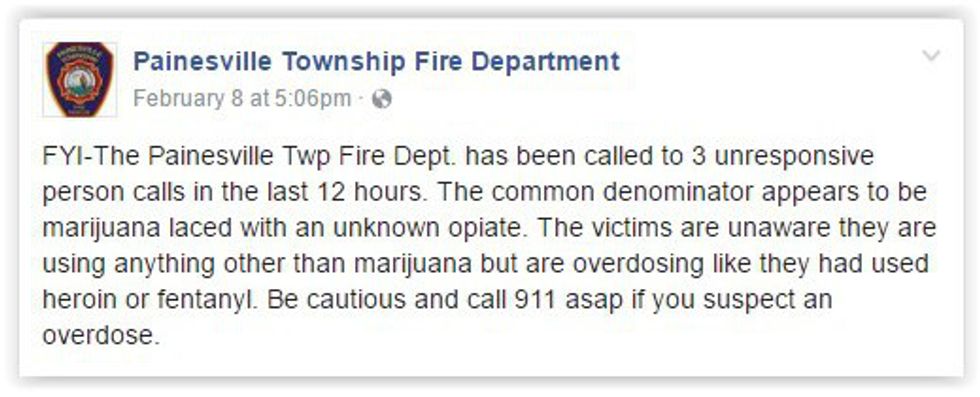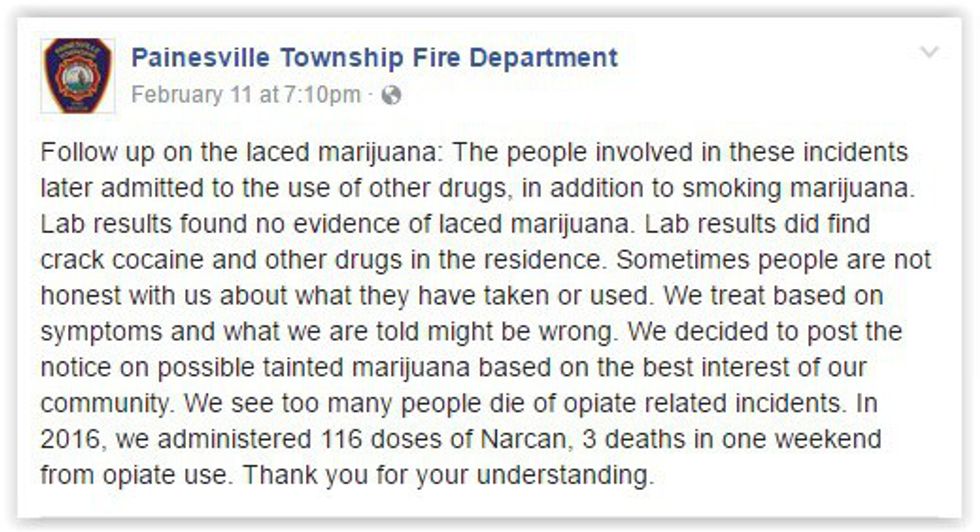Within the month of February two events occurred that encouraged me to talk about cannabis in this article. The comments by Jeff Sessions, the Attorney General, about marijuana and an incident in Northeast, Ohio.
Speaking before many, Sessions had this to say about the plant:
Recommended for you
‘‘I see a line in The Washington Post today [Monday] that I remember from the ‘80s,’’ Sessions said. ‘‘’Marijuana is a cure for opiate abuse.’ Give me a break. This is the kind of argument that’s been made out there to just - almost a desperate attempt to defend the harmlessness of marijuana or even its benefits. I doubt that’s true. Maybe science will prove I’m wrong.’’ (The Boston Globe).
Mr. Sessions, to be blunt, science does prove you wrong. Opiate overdose death rates are up 250% since 1999 alone. The same report, by the National Academies of Science, Medicine and Engineering, has found that cannabis cures pain and chronic pain, just as opiates do. However, marijuana is significantly less habit forming and has no known lethal dose. One final note from the Boston Globe:
According to a 2014 study in JAMA Internal Medicine, states with medical marijuana laws between 1999 and 2010 saw, on average, about 25 percent fewer opiate overdose deaths than states without such laws. What’s more, the effect of a medical marijuana law appeared to grow over time - more lives were saved each additional year after the laws’ implementation, suggesting an effect from more people taking advantage of the programs.
Quinnipiac Polls found two interesting statistics about Americans; 71% of Americans oppose the federal government enforcing their own laws in states where the plant is legal and 93% of Americans believe marijuana should, at a minimum, be legalized for medical purposes. Jeff Sessions denies Americans feel this way and that the plant has benefits.
How can he deny this? Well, the alcohol industry as a whole opposes all forms of legalized cannabis. The fear is present that legalization would significantly reduce the sale of their product; the negative factors of alcohol (addiction and bodily damage) are not present with cannabis. What does this have to do with Sessions, though? Well, the alcohol lobby gave Sessions $80,000 and has given the GOP $85 million during Sessions' Senate career. When will our authorities and lawmakers finally realize the solution to this cannabis conundrum?
Finally, a couple of weeks ago the Northeast Ohio township posted the following on their Facebook Page:
This raised the concerns of many in the community. Not only is Ohio dealing with an opiate epidemic, but this instance seemed to raise new problems. Generally speaking, we are usually afraid when we are deceived; we expect one outcome and receive another Luckily this was not the case in Painesville, they posted this update later during the investigation:
Regulation is a core component in the push for legalized marijuana. The most beneficial aspects of legalizing the plant are its medical benefits, as we briefly explored earlier, along with profit from tax dollars. However, there is yet another reason (among various others) to end the prohibition of cannabis: regulation. If marijuana becomes fully legalized, regulations would be put in place to regulate the plant for public safety. Contaminants in cannabis could be removed, or at least significantly reduced by setting purity standards similar to those in Canada. These regulations prevent unwanted byproducts from entering into the final product of the plant. Regulation gives users a choice: buy from a dispensary where the cannabis is guaranteed to be safe, or buy on the streets where the content of the product is unknown.
In short, cases occur where cannabis is laced with a harmful substance. The consumer unknowingly and undesirably consumes these harmful substances. Not only will legalization of the plant give society psychological, physiological, emotional and financial benefits, (taxation and reduced prison population) but legalization will also allow for safety regulations which may prevent cases such as those in Painesville. Americans in general support medical legalization at the very least. Both of the stories I have presented are two of the problems with America's drug policy. In conclusion, I will ask you to look at the federal government's definition of a Schedule I drug and then decide for yourself where marijuana should be on the legalization spectrum. If only those in authority would do the same; then the cannabis conundrum in America would really be no problem at all.




















